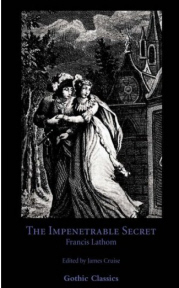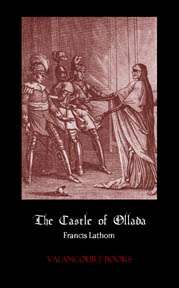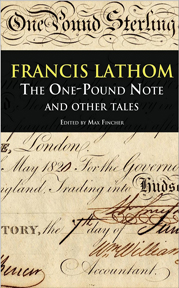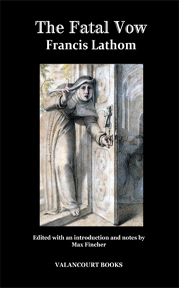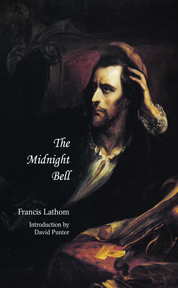
The Midnight Bell: A German Story (1798)
Francis Lathom, Introduction by David Punter
Young Alphonsus Cohenburg enters his mother's bedroom and finds her covered in blood. She tells him his uncle has murdered his father, and orders him to flee Cohenburg castle forever to save his own life!
A disconsolate exile, Alphonsus wanders the earth seeking the means of survival, first as a soldier, then a miner, and finally as sacristan of a church, where he meets the beautiful Lauretta. They wed and establish a home together, and everything seems to promise them a happy future. But their domestic tranquillity is shattered, when a band of ruffians kidnaps the unfortunate Lauretta! Alphonsus must solve the mystery of Lauretta's disappearance and the riddle of his mother's strange conduct. And when he hears that ghosts inhabit Cohenburg castle, tolling the great bell each night at midnight, the mystery only deepens….
One of the greatest of all Gothic novels, The Midnight Bell (1798) features a blend of fast-paced action and spine-tingling suspense, pervaded throughout by a tone of profound melancholy. This edition, the first in forty years, features a new introduction by David Punter, one of the world's foremost experts on Gothic literature.
Francis Lathom, Introduction by David Punter
Young Alphonsus Cohenburg enters his mother's bedroom and finds her covered in blood. She tells him his uncle has murdered his father, and orders him to flee Cohenburg castle forever to save his own life!
A disconsolate exile, Alphonsus wanders the earth seeking the means of survival, first as a soldier, then a miner, and finally as sacristan of a church, where he meets the beautiful Lauretta. They wed and establish a home together, and everything seems to promise them a happy future. But their domestic tranquillity is shattered, when a band of ruffians kidnaps the unfortunate Lauretta! Alphonsus must solve the mystery of Lauretta's disappearance and the riddle of his mother's strange conduct. And when he hears that ghosts inhabit Cohenburg castle, tolling the great bell each night at midnight, the mystery only deepens….
One of the greatest of all Gothic novels, The Midnight Bell (1798) features a blend of fast-paced action and spine-tingling suspense, pervaded throughout by a tone of profound melancholy. This edition, the first in forty years, features a new introduction by David Punter, one of the world's foremost experts on Gothic literature.
|
BOOK DETAILS
Trade paper ISBN-13: 978-1934555125 List Price: $18.99 U.S. Pages: 256 Published: 2007 |
|
ALSO AVAILABLE THROUGH ONLINE RETAILERS
MORE TITLES BY THIS AUTHOR
SEE THE COMPLETE LIST OF TITLES HERE
AUTHOR BIOGRAPHY
Francis Lathom (1774-1832) was born in July 1774 at Rotterdam to Henry and Sarah Lathom. Henry Lathom was a Norwich merchant engaged in business with the East India Company in Holland. Around 1777, the family returned to the vicinity of Norwich, and in the 1790s Lathom began to pen plays for the Theatre Royal Norwich, including the comedies All in a Bustle (1795) and The Dash of the Day (1800), the latter of which was acted to “universal applause” and ran into at least four editions. In 1795, Lathom published his first novel, The Castle of Ollada, a Gothic romance indebted to Ann Radcliffe’s The Mysteries of Udolpho (1794) and Walpole’s The Castle of Otranto (1764).
In 1797, Lathom married Diana Ganning, daughter of Daniel Ganning, a wealthy lawyer and landowner, with whom he had three children, Henry Daniel (b. 1799), Frederick (b. 1800), and Jessy Ann (b. 1803). The following year, he published what became his most famous novel, The Midnight Bell (1798), which was mentioned in Jane Austen’s Northanger Abbey (1818) and which was the only of Lathom’s novels reprinted in the 20th century. He followed this success with the satire Men and Manners (1799), described by critic Montague Summers as Lathom’s masterpiece and worthy of a young Dickens, and Mystery (1800), a curious mixture of the Gothic with epistolary domestic romance.
Around 1802 or 1803, under circumstances not yet known, Lathom left Norwich, perhaps for Scotland. Lathom’s father’s will provided him an annuity of £200 per year, provided that he relinquish custody of his children to Diana and have nothing more to do with them. Summers posited that Lathom’s removal from Norwich may have stemmed from a gay love affair, which, while not substantiated, may nonetheless be true.
Between 1802 and 1809, Lathom was extremely prolific, publishing the novels Astonishment!!! (1802), The Impenetrable Secret, Find it Out! (1805), The Mysterious Freebooter (1806), Human Beings (1807), The Fatal Vow (1807), The Unknown (1808), London, or, Truth Without Treason (1809), and The Romance of the Hebrides, or, Wonders Never Cease (1809). After 1809, he disappeared from the publishing scene and apparently travelled to America, where he visited New York and lived for a time in Philadelphia.
In 1820, Lathom returned to publishing, releasing Italian Mysteries and the collection The One-Pound Note and Other Tales. He continued to write throughout the remainder of the decade; these later works include Live and Learn (1823), in which the friendship between the two male characters was felt by Summers to be “clearly” queer in nature, as well as two additional collections of short stories and the novels Young John Bull (1828) andMystic Events (1830). Lathom is said to have died in Fyvie, Aberdeenshire, Scotland in 1832.
In 1797, Lathom married Diana Ganning, daughter of Daniel Ganning, a wealthy lawyer and landowner, with whom he had three children, Henry Daniel (b. 1799), Frederick (b. 1800), and Jessy Ann (b. 1803). The following year, he published what became his most famous novel, The Midnight Bell (1798), which was mentioned in Jane Austen’s Northanger Abbey (1818) and which was the only of Lathom’s novels reprinted in the 20th century. He followed this success with the satire Men and Manners (1799), described by critic Montague Summers as Lathom’s masterpiece and worthy of a young Dickens, and Mystery (1800), a curious mixture of the Gothic with epistolary domestic romance.
Around 1802 or 1803, under circumstances not yet known, Lathom left Norwich, perhaps for Scotland. Lathom’s father’s will provided him an annuity of £200 per year, provided that he relinquish custody of his children to Diana and have nothing more to do with them. Summers posited that Lathom’s removal from Norwich may have stemmed from a gay love affair, which, while not substantiated, may nonetheless be true.
Between 1802 and 1809, Lathom was extremely prolific, publishing the novels Astonishment!!! (1802), The Impenetrable Secret, Find it Out! (1805), The Mysterious Freebooter (1806), Human Beings (1807), The Fatal Vow (1807), The Unknown (1808), London, or, Truth Without Treason (1809), and The Romance of the Hebrides, or, Wonders Never Cease (1809). After 1809, he disappeared from the publishing scene and apparently travelled to America, where he visited New York and lived for a time in Philadelphia.
In 1820, Lathom returned to publishing, releasing Italian Mysteries and the collection The One-Pound Note and Other Tales. He continued to write throughout the remainder of the decade; these later works include Live and Learn (1823), in which the friendship between the two male characters was felt by Summers to be “clearly” queer in nature, as well as two additional collections of short stories and the novels Young John Bull (1828) andMystic Events (1830). Lathom is said to have died in Fyvie, Aberdeenshire, Scotland in 1832.

